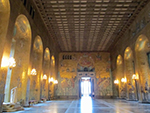
Each year, Nobels are awarded to honor the highest achievements in six areas - physics, chemistry, physiology or medicine, economics, literature and peace. The Prize transforms a scientist to a rock star and remains the ultimate recognition for a scientific achievement.
This year, the Nobel prize in Chemistry was awarded to Jacques Dubochet from the University of Lausanne in Switzerland, Joachim Frank from Columbia University, New York and Richard Henderson from the MRC Laboratory of Molecular Biology in Cambridge, UK.
They developed a microscope that allows the visualization of individual biomolecules, a technique called cryo-electron microscopy. It produces never before seen 3D images of individual molecules which has already led to broad new understandings of molecular structures like the Zika virus. This has allowed scientists to create new drug therapies.
The Nobel Prize in Physiology or Medicine was awarded to US doctors Jeffrey Hall, Michael Rosbash and Michael Young for their work on the molecular mechanisms controlling circadian rhythm - also known as your biological clock. They discovered a gene called Per that produces a protein which is instrumental in setting the clock and how it controls our internal sense of time keeping. Understanding this mechanism can help prevent disease.
These are significant discoveries that will continue to reap benefits for years to come.
More Information
Official Web Site of the Nobel Prize
See information about awardees, all of the nominees plus the award ceremonies.
2017 Nobel Prize in Physics
Physics was the prize area which Alfred Nobel mentioned first in his will. The Nobel Prize in Physics is awarded by the Royal Swedish Academy of Sciences, Stockholm, Sweden...
2017 Nobel Prize in Chemistry
Chemistry was the most important science for Alfred Nobel's own work. The development of his inventions as well as the industrial processes he employed were based upon chemical knowledge. Chemistry was the second prize area that Nobel mentioned in his will.
2017 Nobel Prize in Physiology or Medicine
Alfred Nobel had an active interest in medical research. Through Karolinska Institutet, he came into contact with Swedish physiologist J'ns Johansson around 1890. Johansson worked in Nobel's laboratory in Sevran, France during a brief period the same year. Physiology or medicine was the third prize area Nobel mentioned in his will...